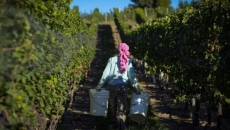Canada's unemployment rate continued to trend higher in August — reaching 6.6 per cent — as the job market slowdown hits workers and job seekers unevenly.
Statistics Canada’s labour force survey on Friday showed the economy added a modest 22,000 jobs last month, lagging the pace of population growth.
The jobless rate increased from 6.4 per cent in July.
As the job market continues to weaken under the weight of high interest rates, students and recent immigrants are shouldering much of the pain.
Recent immigrants, for example, have not seen their wages rise over the last year, despite other workers enjoying significant raises.
Overall, average hourly wages in August were up five per cent from a year ago, reaching $35.16.
However, average hourly wage growth for those who landed in Canada in the last five years decreased by 1.3 per cent on a year-over-year basis.
Recent immigrants refers to those with landed immigrant status or permanent residency and does not include non-permanent residents such as international students and migrant workers.
Meanwhile, more established immigrants saw their average hourly wages increase 6.3 per cent.
Canadian-born workers’ wages have risen six per cent over that period.
Students returning to school in the fall also faced a particularly challenging summer job market this year. Their unemployment rate rose to the highest level since summer 2012, excluding the pandemic summer of 2020.
Between May and August, the unemployment rate for students was 16.7 per cent on average, up from 12.9 per cent last year.
"Much of the unemployment rate increases to-date have come from longer job searches for new labour market entrants (particularly students) but layoffs are also rising under the surface," wrote RBC assistant chief economist Nathan Janzen in a client note.
The summer job market was even more difficult for Black, Chinese and South Asian students, who faced considerably higher unemployment rates.
Black students had the highest unemployment rate of 29.5 per cent, up a whopping 10.1 per cent from summer 2023.
The latest rise in unemployment comes days after the Bank of Canada delivered its third consecutive interest rate cut and signalled more would likely be on the way.
Governor Tiff Macklem has repeatedly said the central bank wants economic growth to pick up again, acknowledging job market slack rising.
"From the Bank of Canada's perspective, higher unemployment coupled with persistent declines in per-capita GDP will reinforce that inflation will continue to drift lower and clearly argues for further interest rate cuts from what are still elevated levels," said Janzen.
As finding work becomes more challenging, the number of unemployed people grew to 1.5 million in August, a 22.9 per cent jump from the same month last year.
Friday’s report notes that of those who were unemployed in July, 16.7 per cent had transitioned to work in August, a smaller share than in August 2023.
Employment last month rose in educational services, health care and social assistance and finance, insurance, real estate, rental and leasing.
Meanwhile, it fell in the other services category as well as professional, scientific and technical services, utilities and natural resources.
Mikal Skuterud, an economics professor at the University of Waterloo, says recent immigrants have been hardest hit by the labour market slowdown because they're competing over the same — often low-wage — jobs.
Skuterud has been tracking real average hourly wage growth for low-skill workers and notes their wages adjusted for inflation haven't increased since 2019.
"If you're living in those immigrant communities — Brampton [in Ontario] is a great example these days — and you're competing with those newcomers, because you're a recent immigrant yourself, you're going after the same rental housing or after the same jobs, you're feeling that pain very differently," Skuterud said.
"That's the part of the story that worries me the most, because what does that do? Well, it creates angst in those communities and undermines support for immigration."
The Liberal government is now trying to tighten the taps on immigration after facing widespread criticism for rapid population growth in recent years.
On Aug. 26, Prime Minister Justin Trudeau announced the government would restore pre-pandemic rules for the temporary foreign worker program to rein in the number of low-wage migrant workers in the country.
Immigration Minister Marc Miller said the government will also be considering reducing its annual permanent resident targets.






